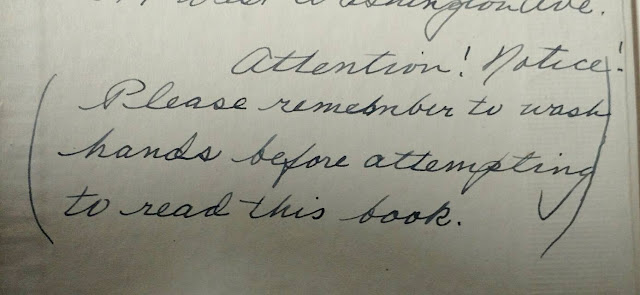Having acquired most of my current book collection from
public library used sales, garage sales, rummage sales, etc., a lot of my books
hold secrets of their previous owners. Bookmarks (or slips of paper such as receipts doubling as bookmarks),
free bookplates (I received about a dozen complimentary Ex Libris stickers for never joining the Readers Digest Book Club),
and inscriptions of strangers’ names are among the surprises I’ve found in used
books.
Whenever I receive a book as a gift (which is quite
often…although not as often as I would like…hint hint), I like to ask the giver
to inscribe my name, their name, and the date on the front page for
posterity. It seems a shame, then, that
there are so many used books which once belonged to someone else whose name is
now meaningless to me.
Part of me views these books as MINE, since I paid for
them (and they were most likely donated to the library booksale of the owner’s
free will). But another part of me can’t
help but feel I am a mere curator of lost possessions, a foster-owner of
orphaned tomes.
So in honor of those readers who came before me, here is
a list of (some) of the inscriptions found inside the covers of my
library. The names have been changed to
protect the innocent, and also to protect me from having to return any books,
should a reader recognize his name and want his copy of Silas Marner back.*
And probably the saddest, most beautiful inscription,
from Tennyson’s Poems:
(A pressed flower
was right inside the cover; I’m not sure what type it is, but it’s a light
pink)
Miss Moller A.
Gibson, compliments of J.P.S. (this was in pencil, and then the handwriting
changes and the rest is written with an old-fashioned ink pen)
In loving
remembrance of dear sister Mary who esteemed you as one of her dear friends.
Grand Blanc
June 1st
1901
S.J.G.
For further reading of other people’s private thoughts,
try looking into The Book Inscription
Project’s website.
When doing my
personal research for this post, I found that mostly older books had more than
a name written on the flyleaf. This is a
shame. Books leave their marks on us,
there is no reason why we shouldn’t reciprocate, even in a small way. So I challenge you: look at your own
bookshelves. Are there any remnants of
readers past in your used books? And
next time you give someone a book as a gift, what words will you share just inside
the front cover?
*Finders keepers, losers weepers.























